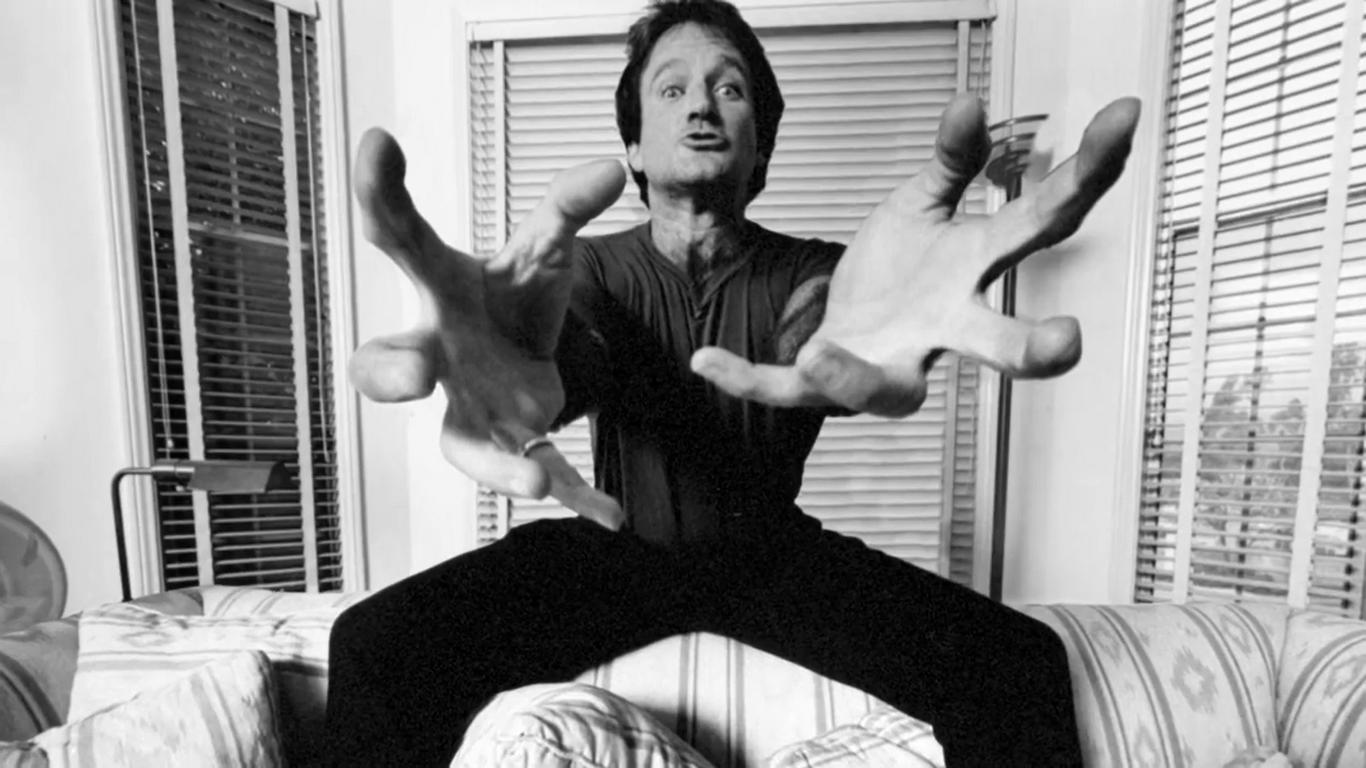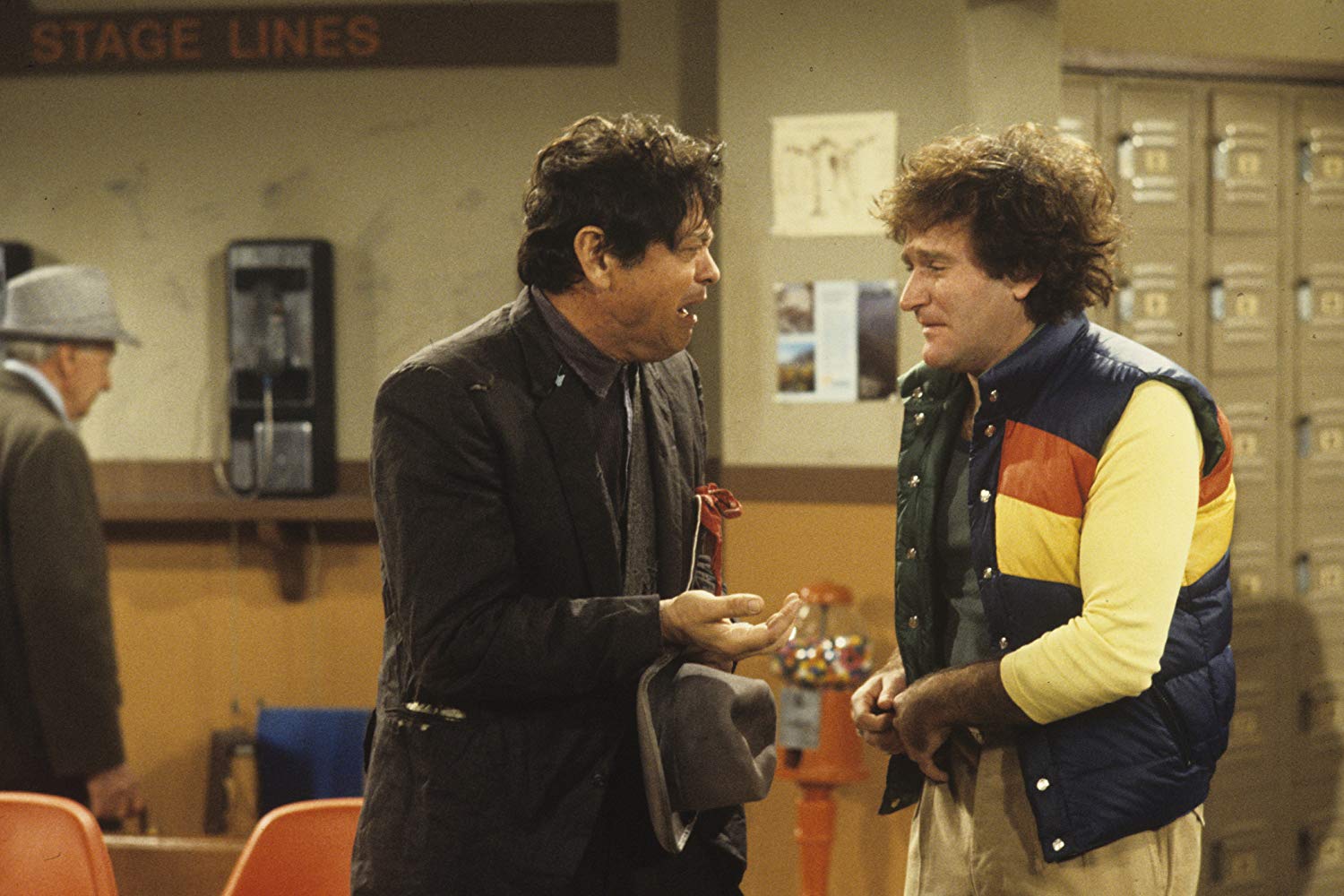Robin Williams’ acting talent leaves a universal legacy

By Leah Martindale, Third Year, Film & TV
Kicking off Epigram Film & TV's celebration of all things comedy, we look back at the career and life of the late Robin Williams.
Few comedic actors come to mind with as far a reach, as diverse a portfolio, or as devastating a personal life as Robin Williams. Love him or lump him, there’s a reason why 150,000 Ranker voters named him the Funniest Person of All Time in 2015.
Williams’ career began on the stand-up circuits of LA and San Fran in the mid-70’s, soon after which he was snapped up for a titular role of Mork in the Happy Days (1974-84) spin-off Mork & Mindy (1978-82). His first feature film role, as the leading man in the musical Popeye (1980) sparked such a cult following that the island erected for its production still stands as a surreal tourist attraction in Malta today. These explosive and hilarious roots led to his meteoric rise to Hollywood stardom.

IMDb / ABC / Mork and Mindy
Boasting inexplicable improvisational skills, a gift for mimicry, and a vocal range that would make a parrot blush, Williams was a touching, honest, and formidable talent. He clearly held his own in drama as well as comedy; his highest accolade, the Academy Award for Best Supporting Actor, came after portraying the troubled psychotherapist Dr. Sean Maguire in Good Will Hunting (1997).
He is also immortalised as an actor in dark comedies, with a penchant for adult humour and heartbreaking underbellies. Often allowing a breadcrumb trail of tragic truth through his works, like the awful truths of the war spattered throughout Good Morning Vietnam (1987) or the suicidal ideation as the catalyst of Patch Adams’ (1998) entire plot, Williams masterfully bolstered the light with something a little darker.
Credited on IMDb with 108 acting roles, Williams’ 34-year screen career was prolific to say the least. Most of us will remember him fondly from comedic roles throughout our childhoods, with five easy roles flying to mind - Mrs. Doubtfire (1993), the Genie in Disney’s Aladdin (1992), Ramon and Lovelace in Happy Feet (2006), Professor Philip Brainard in Flubber (1997), and Teddy Roosevelt in Night at the Museum (2006) and its sequels.
IMDb / Miramax Pictures / Good Will Hunting
As a longstanding Williams fan, I am always baffled by his eternal association with one-talent wonder comedic value. Of my top five Williams films, Dead Poets Society (1989), Good Morning Vietnam, Good Will Hunting, Aladdin, and World’s Greatest Dad (2009) - in no particular order, of course - only Aladdin could properly be categorised a comedy. World’s Greatest Dad, a dark comedy at best and drama at worst, tragically is reported to have taught Williams the method with which he inevitably took his own life.
Williams’ gift for comedy is intrinsically linked to his inherent understanding of tragedy. As Angela Carter said: ‘Comedy is tragedy that happens to other people.’ Tragedy and comedy have eternally been linked, with films like World’s Greatest Dad and The Angriest Man In Brooklyn (2014) walking the fine line between laughing and crying. What made Williams a spectacular artist was his ability to walk that tightrope, constantly swaying into both territories, with the safety net of a knowing, sad clown grin to catch him if the worst comes to the worst.
‘Comedy and tragedy are two sides of the same coin. A talent in one area might also lead to a predisposition in the other.’ Jack Dee’s iconic words will ring true for those with knowledge of Williams’ awful death. Plagued throughout his lifetime with depression, voluntarily admitted in later life for treatment for alcoholism, and suffering in his final years with Parkinson’s disease and Lewy body dementia, the tragedy that wiped off his iconic smile no doubt put it there in the first place. Who better to laugh at the ridiculousness of life than someone well acquainted with reality at its harshest?
IMDb / Touchstone Pictures / Good Morning Vietnam
Williams is credited with innumerable quotes on life, love, laughter, happiness, and joy. The frequency with which he credited with his characters’ words - screenwriter Tom Shulman’s iconic ‘poetry, beauty, romance, love - these are what we stay alive for’ as a perfect example - serves only to highlight the humanity and relatability he brought to every performance. His natural charm made every word as believable as the smile that fooled the world.
In President Obama’s words: ‘[Williams] ended up touching every element of the human spirit. He made us laugh. He made us cry. He gave his immeasurable talent freely and generously to those who needed it most -- from our troops stationed abroad to the marginalized on our own streets.’ The family offered their condolences to anyone who ‘found their voice and their verse thanks to Robin Williams’. What more fitting eulogy to a man with a universal touch than a commendation from the most powerful man in the world?
We mourn the loss of our friend Robin Williams, who always made us laugh and smile. pic.twitter.com/UOY8LTjVRA
— Sesame Street (@sesamestreet) 11 August 2014
‘You’re only given a little spark of madness. You mustn’t lose it.’ Williams’ tragedy was the cracks through which the proverbial light was let in. When the Bicentennial Man realised everyone he loved would one day leave, his response was simply: ‘Well that just won’t do.’ Williams’ insatiable comedic appetite was fed by having one foot in the grave and one in the cha-cha slide: an irreplaceable ability to traverse the tragedy of life and make it funny.
Featured Image Credit: Photo courtesy of HBO
Which of Williams' movies is your favourite?
Facebook // Epigram Film & TV // Twitter
